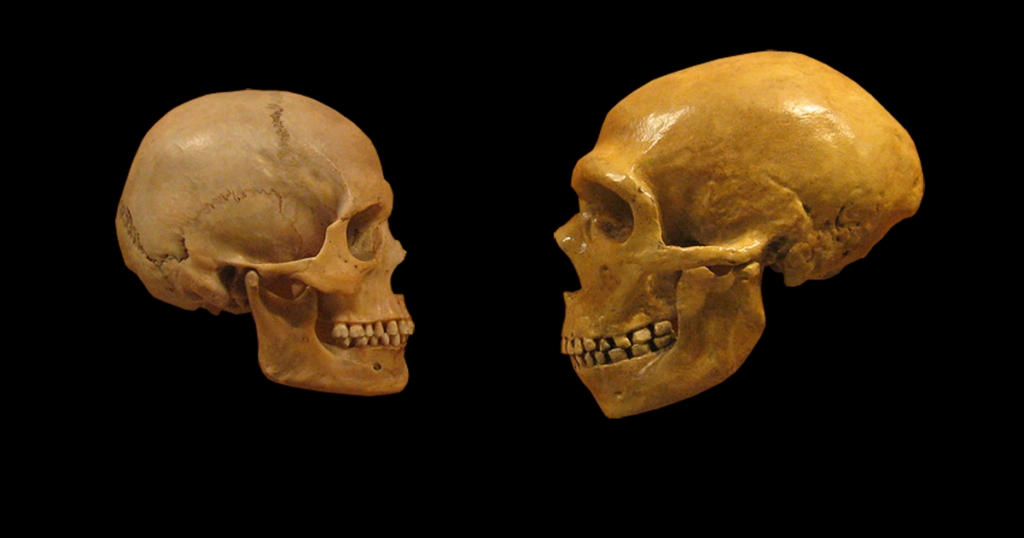I have long asserted that society has contributed to a reversal of natural selection for humans. I am not saying this is bad, or good, just noticing that it seems to be so. For example, lacking the protections of society, a person with poor eyesight or poor hearing, or a poor runner or climber would be an easy target for large predators. Because of that, natural selection would result in culling out those detrimental characteristics, and those with superior skills and senses would be favored. This, of course applies to intelligence, as well. People in modern societies do not need superior skills or intelligence to survive and procreate.
If you are of the mindset that people with college degrees are smarter than those with fewer years of schooling, you still have to agree that, on average, people are less intelligent now. After all, college-educated people have fewer children. I don’t agree with that proposition; there are plenty of people without access to schools, or who have chosen not to go to college, that are just as smart as those who have a Ph.D. Notice here that I am using schooling to differentiate from education in general; the latter includes learning from parents or others and from life experience.
Many years ago I read about other types of intelligence that are not measured by our standard IQ testing. I remember particularly about the abilities of early Polynesians to navigate over thousands of miles to get to their destination islands. Modern humans, Polynesians included, do not have this ability. Another example that comes to my mind is how African Bushmen track animals. They can tell by the smell of dung how long ago the animal was at a particular location. If they had wounded the animal using poisoned spears, they could tell by the smell which dung was from the poisoned animal. People from so-called advanced societies do not have this ability, although I guess it could be learned.
If you could take identical twins, separated at birth, and have one raised in a privileged environment where he or she went to the best schools, and the other raised in the wild, free to roam and explore the world, which would be smarter? The privileged twin would have a more limited and focused set of experiences. The other twin would have a greater variety of experiences from which to learn, and would have skills in many things. You could liken this to someone who had gotten a graduate degree in some specialty versus someone who learned many trades, perhaps not as deeply, but sufficient for a working proficiency in each. Their innate in-born intelligence should be the same. But, considering their experience, would you say one is smarter?
In my mind, intelligence (or smartness) does not refer to what one knows, but how well they can learn and creatively figure things out. And you can learn from all experiences, not just what is taught in school.

When I first read that Neanderthals had larger brains than modern humans, I wondered if they were smarter than we are. I believe, as I argue in the first paragraph, that they must have been smarter (on average) in order to survive the harsh environment they lived in, and without technology. I am sure that this was also true of early modern humans who lived during the same time period as Neanderthals, but did not have larger brains than we do. People in modern societies do not need to be smart; society and its technology bring them along whether they are smart or not.
If we are using less than 100 percent of our brains, then that may be the best evidence that we are not as intelligent as our ancestors. Why is our brain so large? There would be no selective advantage in an increasing brain size, were it not being put to use. So maybe we have effectively turned off abilities that we once had but no longer need. And maybe our society is what has allowed this to happen. What brain percentage do apes use (they do have fairly advanced societies)?
How about other mammals? What about birds? With their very small birdbrains they navigate great distances, figure out how to obtain food, build nests and raise and protect their young (and some even use tools). What about reptiles, fish and bugs? It seems they are all pushing the limits of their very small brains. But we are not.
Is there some other purpose to the hidden capabilities of the brain that we could unlock, if we only knew how? What part do we use when we dream? Are there other abilities, such as mental telepathy, that we don’t believe in, and perhaps have unlearned? Twins, even those separated from birth or at a young age seem to have capabilities that some believe border on telepathy. Or is that just because they are genetically wired to think a certain way?
For some reason, as humans we have selectively focused on certain parts of the brain that we need for our modern society. Creative people use different parts of their brain that are less used by people who focus on logical processes. More recently, as a society we have selectively focused on skills that we think we need for our modern society.
Pablo Picasso said, “Every child is an artist. The problem is how to remain an artist once we grow up.” As we push early education, are we preventing the development of creativity that typifies young children? And, as we push STEM (Science, Technology, Engineering and Math) curricula in our schools, what are we losing?
I believe that Americans have excelled in the world, in large part because we have maintained a creativity born from our historical connection with our ancestral cultures, and because of the needs of building and expanding our nation far from traditional sources of materials. In recent decades, other nations, notably the eastern nations, have pushed technological skills at the expense of the arts. Will we, in our present push to maintain our competitive advantage, actually lose the creative edge that we have had over those countries?
Skulls photo from evolution-institute.org via Google Images.


Hi Ken, I followed the link from Climate Etc.
IQ tests show a steady gain in scores over the last hundred years since the test was devised. That’s the secular effect. Tests have to be re-normed so that the average still works out at 100. So it’s not true to say that today’s kids are less intelligent. Most of this is probably better nutrition, better prenatal care and cleaner environment, i.e. the removal of factors that stunted the IQ potential at the moment of conception. In developed nations, the IQ gain is leveling off.
As far as percentage of brain capacity used by humans go, if a bird can navigate with a brain that size, obviously navigation is not a cognitively challenging task. The guys who map brain function can see which parts of the brain light up when humans do different stuff and they haven’t found any part of the brain that stays switched off all or most of the time. Language and other human things are cognitively challenging and our brains are hard at work with not a lot of spare capacity, even when we’re just watching a movie.
Thanks for an interesting article.
Thanks for visiting the site. Regarding my suggestion that we may be less intelligent, I think it is likely to have occurred over thousands of years, not so much generation to generation. IQ tests tend to test what we know, rather than how well we figure things out. That is why there was race-bias, which is really socioeconomic bias. I too have read that most parts of the brain are used, but I doubt it is most of its capacity. My guess is that some parts were used for needs that we don’t have now, because society does not require them anymore. And, although I originally got the idea from the Neanderthals having a larger brain (not necessarily more intelligence, but it made me wonder – and this was probably 40-50 years ago), I think a decline may have occurred with Homo sapiens sapiens as well. (Note here I am using the older, and I think more correct name, as I think Homo sapiens neandertalensis should be resurrected as they clearly interbred). My comments that we may be making things worse is regarding reducing our childrens’ exposure to things not considered “important.” Anyway, I will be writing more on the subject of development of intelligence, and consciousness as well. And, I will occasionally write on the subject of education today.
And, I will be checking out your site. So far I’ve just perused the latest article on Zuckerberg and Worstall.